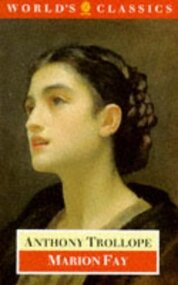
I can’t help but suspect that Marion Fay (1882) is a literary bubble and squeak. Trollope seems to have taken some leftover plots and put them together, seasoning them with a dash of sensation. He did have a habit of popping half-written manuscripts in a drawer, secure in the knowledge that they could in future bring him some much-needed income. The novel was published not long before he died, so perhaps we can forgive him for going slightly off the boil.
Despite the title, Marion Fay mainly concerns the amorous adventures of the Marquis of Kingsbury’s children: Lord Hampstead and Lady Frances Trafford. To their step-mother’s disgust, both have fallen in love with commoners, and she is determined that her biological offspring should instead inherit the title and family estates. Lady Frances receives the attentions of George Roden, a modest postal clerk and friend of her brother. Lord Hampstead is desperate to win the heart of wheezy Quakeress Marion Fay, who fears that the exertions of a wedding night would finish her off. His persistence is both touching and slightly disturbing, and his refusal to take no for an answer brought back unpleasant memories of Tom Tringle in Ayala’s Angel. Hampstead’s dubious references to fire poking no doubt served to alarm Marion, and indeed the reader. Lady Frances’ determination comes from an admirably strong will, and her hymeneal plans are given a boost when her humble lover turns out to be the Duca di Crinola. Although his exotic aristocratic title brings him no fortune, his windbag of a boss, Sir Boreas Bodkin, arranges a stellar promotion.
The plot is decidedly stodgy, and aside from Roden’s change in fortune, very little happens. At around 600 pages, Trollope could have put quite a bit of it back in his drawer. However, some of the characters are an absolute delight. Thomas Greenwood is a rapacious clergyman who attempts to retain his sinecure by helping the Marchioness of Kingsbury contrive the demise of her stepson (a plot strand that isn’t really developed). The Marquis of Llwddythlw (whose name looks like a bad hand at Scrabble) is a ponderous parliamentarian, who would much rather be debating the merits of electric lighting than getting married. He fantasises about using chloroform to get him through the ceremony. The post office clerk Samuel Crocker was my favourite. He basks in the reflected glory of his colleague’s dukedom and aristocratic friends, believing they will give him an entrée into the upper echelons of society. Benefiting from heaps of audacity and the hide of a pachyderm, he almost pulls it off, but some sloppy administration proves to be his downfall.
Essentially, Marion Fay is an inheritance plot that fails to fulfil its initial promise. My considerable criticisms aside, it is worth a read for the comic flourishes.
Marion Fay by Anthony Trollope